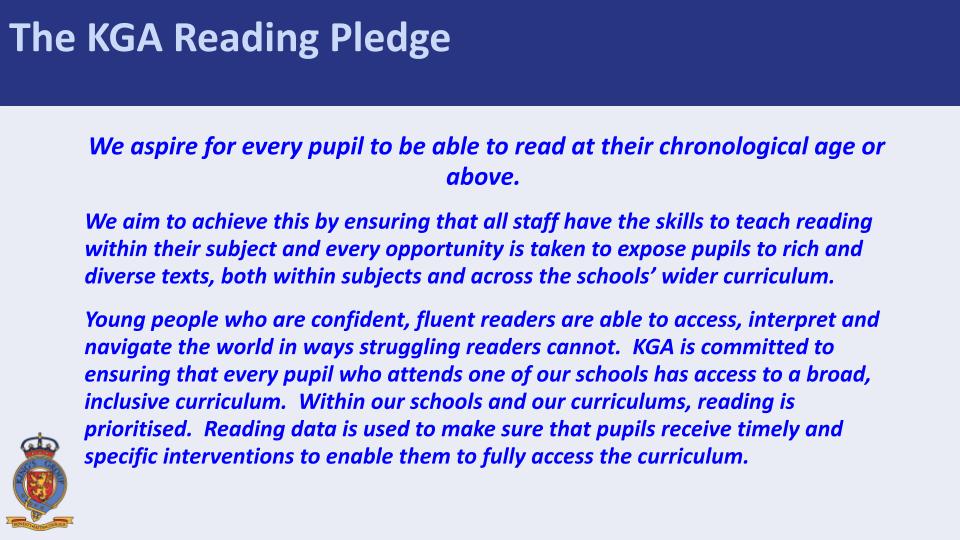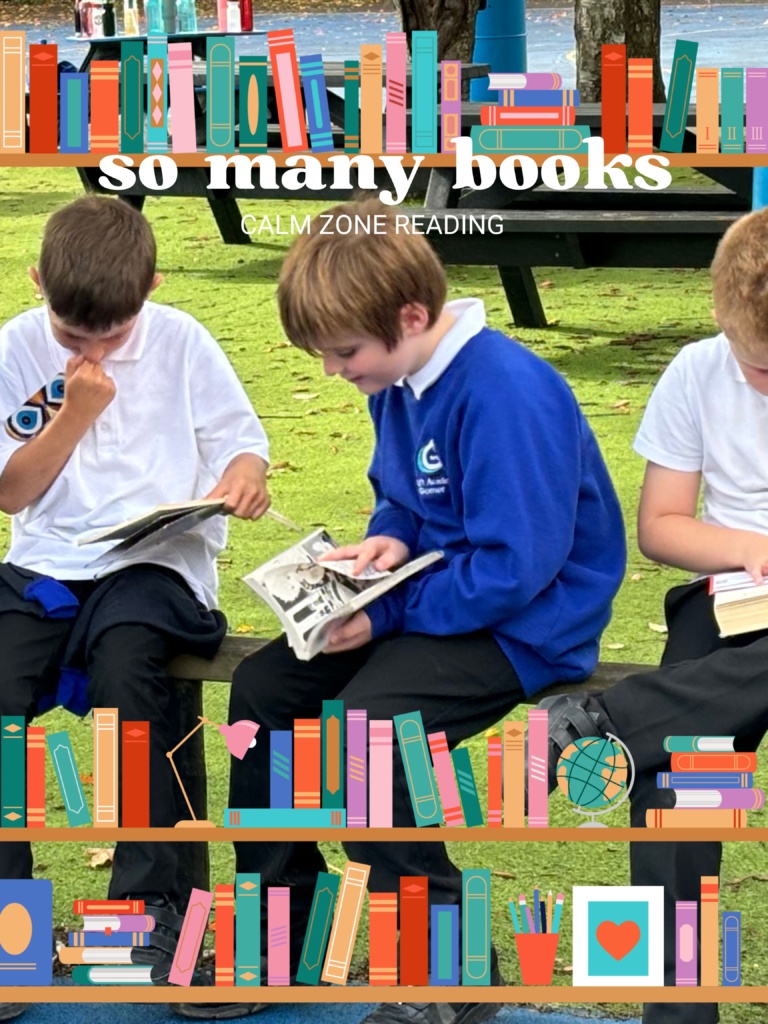“The more that you read, the more things you will know. The more you learn, the more places you’ll go.”— Dr. Seuss, “I Can Read With My Eyes Shut!”
We love to read at King’s Academy Gomer and find as many opportunities to do so. We recognise that reading is an essential skill. It develops the brain, provides a window into the world around us and helps us do better in all school subjects. Did you know that?
- 800 million people around the world cannot read or write
- Many families (and some schools) have no books for children to read – we raised funds on our last World Book Day to help change this.
We are lucky at Gomer to have lots and lots of books which we look after and refresh regularly. Some children at Gomer find reading tricky or read with confidence and struggle to extract key information – inference. We are working hard on developing the children’s inference skills alongside engendering a love of reading for pleasure. Outlined below is how we incorporate reading into everyday life at Gomer. For tips on how to help with reading at home please visit our reading at home help page here.

Reading Curriculum
At King’s Academy Gomer, we are committed to ensuring that all pupils maintain the progress made during Key Stage 1 in phonics. To support Year 3 learners, we utilise the Read Write Inc (RWI) phonics scheme, which plays a key role in developing both reading fluency and spelling accuracy across the school.
Reading is integrated into all curriculum areas in our school to help support children become fluent and confident readers. Children read to be informed and entertained across a range of subject areas – we have a genre map to ensure good coverage. Reading is a consistent expectation for Home Learning and parents are kept well informed of their child’s progress through termly learning review meetings, banded books, and reading diaries in the lower school (where required). We also link the Hampshire online reading platform to our home learning slides to encourage the use of E-books that all our families can access.
The skills of reading are taught in each year group upon entry to KS2. There is a daily reading focus every day, in every year group, and it is planned to suit the needs of the cohort. Class teachers lead focus groups to enable children to access texts which challenge them to extend and develop the critical skills of inference and deduction, at all levels (see guided reading plan).
Reading resources to support the reading curriculum are primarily drawn from two main schemes of work: the Badger Learning ‘real’ texts and the Project X reading scheme. These schemes, with their colour banding system, aim to provide a framework for progression from Key Stage 1 to Key Stage 2, helping to prepare pupils for the transition to secondary school.

Learning to read at King’s Academy Gomer
Through the continued use of the Read Write Inc scheme, alongside tailored interventions and regular assessments, we aim to ensure that no pupil regresses in their phonics knowledge as they move from Key Stage 1 to Key Stage 2. By embedding phonics into both reading and spelling practices, we will support all pupils in developing the skills necessary for fluent reading and accurate spelling, providing them with a strong foundation for future learning.
Children learn to become fluent readers through books levelled with coloured Book Bands in Key Stage 1 and 2. Book bands enable both the Infant and Junior schools to introduce a breath of genres and authors across a variety of published reading schemes, where children access a variety of texts to keep them engaged during their journey to literacy. The colour bands are applied consistently across the 2 Gomer key stages, between schools, which help enable progression through the National Curriculum standards.
The guided reading schemes used to teach children the skills of understanding texts, also use the book banding system, so that children are easily resourced for and taught using this consistent method of assessment and identification.
“Reading is to the mind what exercise is to the body”, Joseph Addison.
Reading Spine and Reading Canon Year 3-6
Reading Assessment
- We use the transition process with the infant school to ascertain which children will require continued phonics teaching
- On entry to the Junior school, children are assessed again using the Salford reading test. This gives the receiving teacher a baseline age-related score, which can be used as a comparable measure alongside peers and at assessment intervals during the academic year.
- On entry to the Junior school, for children who did not pass the Y1 phonics screening test, are screened for phonics.
For children who are not currently at age-related expectation in reading (ARE) or on the register for having SEND, this measure is repeated in subsequent year groups to track progress.
- Formative assessment (during a teacher unit) is collated from weekly focussed guided reading sessions, which occur to enable children with the skills to decode unfamiliar words and to understand and appreciate a range of texts and genres.
Children who are on the SEND register with poor phonics understanding will receive reading support which continues to use programmes from Key Stage 1. In King’s Academy Gomer this is Read, Write Inc and Fresh Start. Children’s early reading is also supplemented by the Book Life Scheme. These interventions are tracked formatively assessments, through their bespoke assessment systems track progress and attainment throughout the programmes of study.
- Summative assessment is also completed at the end of each half-term making use of NFER tests. These enable teachers to assess comprehension ability and also analyse specific areas of weakness or strength in individuals and across a year group. This information can then be used to strategically plan for each child in the future term or academic year.
Decoding and Phonics
We pay close attention to the KS1 phonics screening. All pupils who did not pass the screening at KS1 on the first time are screened when they join us. We currently follow Read Write Inc to complement the approach of Gomer Infant.
Low-attaining readers are supported, in addition to the regular curriculum, with these successful intervention schemes:
- Read Write Inc Phonics
- Read Write Inc Fresh Start
These phonic interventions are further supplemented with reading interventions provided by Rapid Reader, Toe by Toe and the Booklife Scheme.
Discover Sora – Free eBooks & Audiobooks for Our Young Readers!
What is Sora?
Sora is a brilliant digital library that gives children access to a vast collection of age-appropriate eBooks and audiobooks. Whether they prefer to dive into an exciting adventure, explore fascinating facts, or listen to a story read aloud, Sora offers something for every reader.
Why Use Sora?
- Completely Free – Pupils can borrow books at no cost, anytime and anywhere.
- Accessible on Any Device – Sora can be used on tablets, laptops, and smartphones via the free app or web browser.
- Encourages Reading for Pleasure – With a variety of genres and interests available, children can discover books they truly enjoy.
- Supports Learning – Audiobooks can help develop listening skills and fluency, particularly for reluctant or developing readers.
- Easy to Use – With simple navigation, children can borrow, return, and bookmark books with ease.
How Can My Child Access Sora?
- Download the Sora app (available on iOS & Android) or visit soraapp.com.
- Select Hampshire County Council as the library.
- Log in using their school Google account and choose Hampshire Library Service and King’s Academy Gomer
- Start exploring and enjoying the collection!
Watch this video for more help and information.
Reading Across the Curriculum
At Gomer, we don’t just love reading – we celebrate it! Throughout the year, we incorporate exciting enrichment activities that inspire a love for books across the whole school. From our much-anticipated World Book Day Bake Off to the cosy Booky Breakfast, we create memorable experiences for our pupils to enjoy together. Our Year 3 pupils especially look forward to the festive tradition of Jolabokaflod, and we proudly support the Library Summer Reading Challenge to keep reading alive during the holidays.
These activities are more than just fun; they play an important role in keeping our keen readers engaged and encouraging those who might need an extra boost. At Gomer, we’re passionate about fostering a lifelong love of reading.
Go Gomer!
